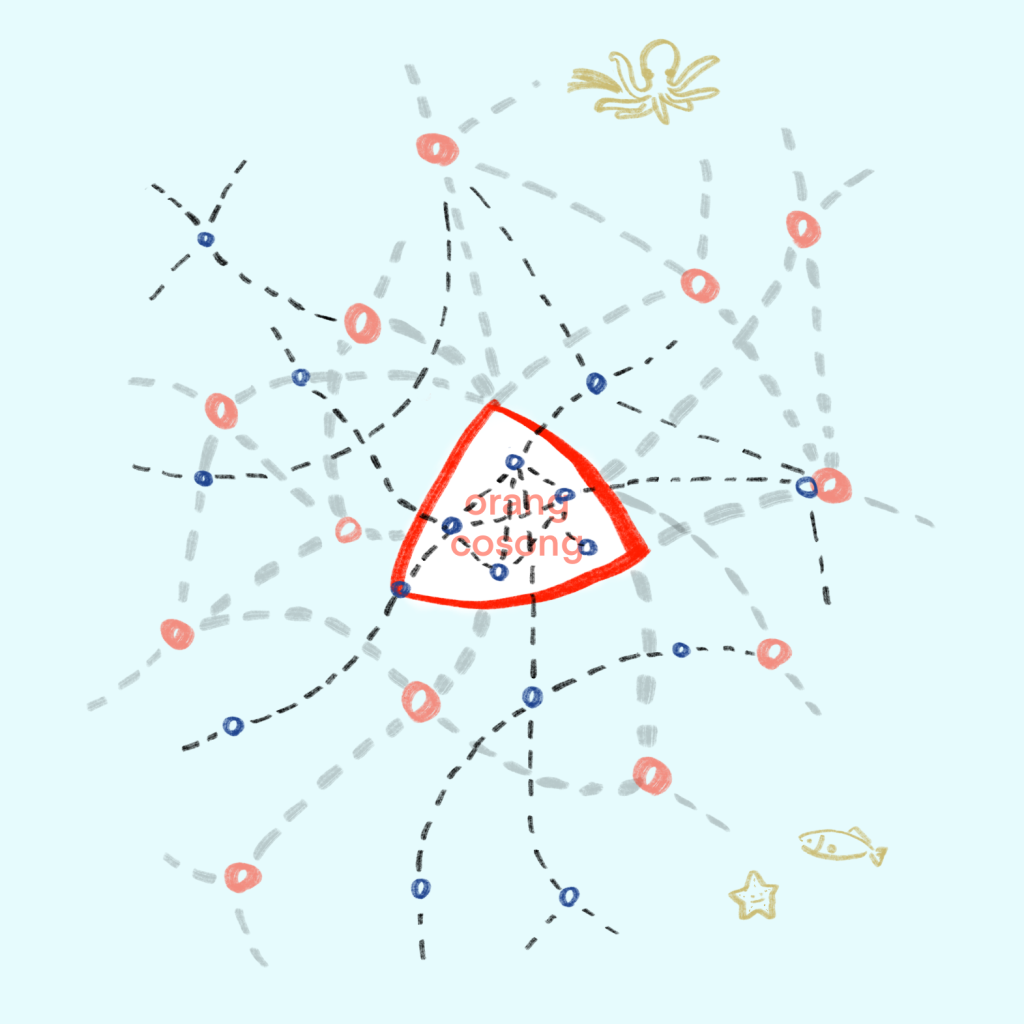
We, orangcosong, aim to continuously carry out various research and creations on the theme of human ‘mobility’ and ‘gravity’ in several European cities (Düsseldorf, Bilbao, Milan, Nicosia, etc.).
Under this big umbrella called “Déraciné Rhizome”, we will realize a parallel and combined cycle of artist residencies and present it as a sustainable model.
About the image of the Déraciné Rhizome
In this ‘Déraciné Rhizome’ project, orangcosong does not present a single piece of work in just one city. We aim to carry out some creative processes over several years, communicating with local theatres, museums and cultural institutions.
For example, in Bilbao, where we held ‘Hitsudankai’ already in 2023, we will have residency research for ‘Engeki Quest’ in 2024, and the completed work will be presented in 2025. In parallel, another creative process will be realized in other cities, such as Düsseldorf, Nicosia, Milan…etc.
In every creation process, there is an involvement of residents including local artists, so the relationship with them will also continue in this parallel period.
We believe that this parallel and combined cycle of artist residencies is also an effective response to climate change issues.
Unlike in Europe, cross-sea travel is necessary for cultural exchanges in East and South-East Asia where we live. A balance needs to be found so that climate change awareness does not become a denial of cultural exchange. It may also happen that experimental works by young emerging artists without sufficient careers will not be easily invited to other countries.
So what should we do?
As an answer to this question, orangcosong combines multiple research and creation in parallel. We will make a circular ecosystem, and present it as a model of sustainable artist residency production.
We will not only present our work, but also grow up relationships with local people and organizations over time, by sharing the process of our creation and research. Of course, this process will create some friction and misunderstandings, but it will also be a process of understanding the cultural differences in each other’s backgrounds. We can call it an “organic relationship”, it should not be easily consumed by the ad hoc market desires. Also, it should not be a privileged network occupied by only a few people. Rather, orangcosong will open up a rhizomatic network: no one can see the limit line of this network.

The project title ‘Déraciné Rhizome’ is named after such an image of a sustainable circular ecosystem.
“Sustainability”, “circulation” and “eco-system” are all trendy keywords these days, but we want to link them to the art activities of each of us.
In the research and creation of this project, we, orangcosong, focus on people who could be called ‘déraciné’ – although they may not self-identify as such ‘déraciné’. That is, people who have had their roots pulled out of the land where they were born and raised.
In particular, our focus will be on those who live as ‘artists’ who live scattered across Europe. We will visit their ‘home ground’, and collect images of ‘mobility’ and ‘gravity’ (being careful not to exploit their stories). We would like to be aware of the accumulation of fragmented realities, and call it ‘Rhizome’.
The concept of rhizome is very old, first presented more than 40 years ago by the philosophers Deleuze & Guattari. But we orangcosong use this image as a network of their fragmented realities: the ‘déraciné’ artists are sometimes facing difficulties, but they are putting down their roots in a new land, adapting, eroding, or being eroded.
By visualizing, sharing, and embedding this rhizome into our deep imagination, we believe that we can understand the complexity of the world deeply and break out of the old paradigm. For example, we will no longer consume artists according to the logic of the art market, and stop to repeat a parrot question, “Who is next?” We can also explore the possibilities of diverse artistic expression without being drawn only to fashionable themes and contexts.
Such a shift in attitudes is important for our sustainability, circulation, and ecosystem. It is necessary to break out of the cycle of consumption and exploitation.

Finally, we would like to add that it is not easy for the ‘rhizome’ to find connections across oceans to other continents. Compared to the difficulties of sustaining intercultural exchange and mutual understanding, prejudice, discrimination, and division spread more easily like a pandemic. When our mutual distrust, contempt and hostility continue to further increase and finally we are unable to love others, human beings may perish.
But as long as we are alive, we cannot just perish. We want to do something interesting and make our lives better. And we want to grow healthier and kinder relationships between people, not by consuming, exploiting or attacking others (if we can).
But our real societies are far from ideal societies. For now, we can carefully, steadily, and sometimes acrobatically connect each different piece of reality that is scattered around the world. And we need to cross oceans to understand diverse cultural backgrounds and complex realities.
2023.12.1 orangcosong(Chikara Fujiwara + Minori Sumiyoshiyama)
